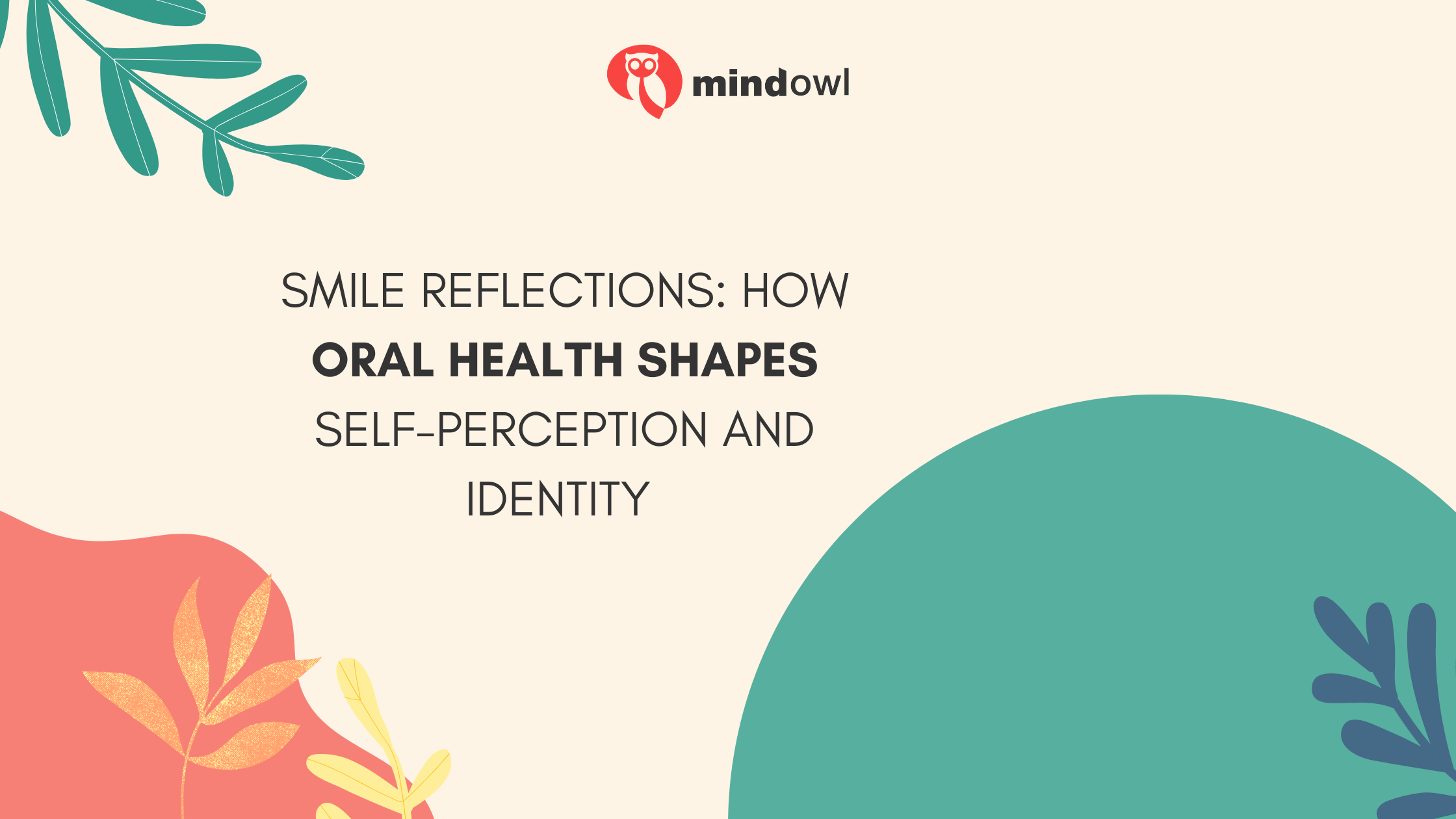Beyond just chewing and speaking, oral health significantly impacts how you view yourself and interact with the world. Flashing a healthy smile can do wonders for your confidence, while mouth troubles can put a damper on how you feel about yourself and even make socializing a drag.
Discover how oral health impacts self-perception and identity, and learn tips to keep your smile shining for a happier, more confident you.

The Basics Of Self-Perception
Self-perception is an individual’s internal portrait, built from experiences and interactions. It encompasses how a person perceives their strengths, weaknesses, and characteristics. This mental image, formed by thoughts, feelings, and actions, shapes both self-esteem and identity.
It’s not a fixed state; it can change as individuals gain new experiences or re-evaluate their views and values. Ultimately, self-perception acts as a lens, influencing how a person sees the world and makes decisions about actions and goals.
Oral Health And Self-Perception
The state of one’s oral health directly impacts one’s self-esteem and confidence, reflecting in every smile and conversation. Here are some aspects it can influence:
Self-Esteem And Confidence
Good oral health not only improves physical wellness but also bolsters psychological well-being. Individuals with healthy teeth often project a higher level of self-assurance and are perceived as more sociable and happy, given their willingness to smile openly.
On the flip side, dental issues like misaligned or discolored teeth can undermine confidence, making individuals feel self-conscious about their appearance. This insecurity often manifests in reduced social engagement and a reluctance to participate in activities that require face-to-face interaction, ultimately impacting personal and professional relationships.
Social Perceptions
Societal standards that equate healthy teeth with attractiveness and cleanliness can deeply affect those with dental issues. The stigma surrounding a poor oral health status may lead others to perceive someone with visible dental problems as less careful about their hygiene or general health, which can significantly impact their social interactions and opportunities.
This sense of judgment can exacerbate feelings of inadequacy and alienation, affecting one’s social life and how they are integrated within their community.
Speech And Communication
Oral health has a direct impact on speech clarity and communication. Issues such as missing teeth, ill-fitting dentures, or severe dental misalignments can hinder articulation, leading to challenges in pronouncing certain sounds effectively.
This can cause embarrassment and reluctance to speak in public or professional settings, further impacting an individual’s self-esteem and how they are perceived by others.
Effective communication is crucial in many aspects of life, and any impediment can lead to significant personal and professional consequences.
Pain And Discomfort
Chronic dental pain, whether from cavities, gum disease, or temporomandibular joint disorders (TMJ), can pervade every aspect of a person’s life.
Constant pain not only detracts from one’s quality of life but also affects mood, productivity, and even relationships. The ongoing discomfort can lead to frustration, a pervasive sense of poor health, and a withdrawal from social situations, significantly diminishing one’s life satisfaction and overall happiness.
Overall Health Perception
The condition of one’s mouth often serves as a window to one’s overall health. Issues like periodontal disease can be linked with systemic conditions such as heart disease, diabetes, and respiratory infections.
Consequently, individuals who suffer from persistent oral health issues might perceive their overall health negatively, which can affect their lifestyle choices, their engagement in preventative health behaviors, and their general outlook on life.
Each of these areas shows how deeply oral health is intertwined with psychological well-being, social standing, and general life satisfaction. Taking care of your oral health is a key part of maintaining and enhancing your mental and social well-being. A general dentist can help you with optimal oral healthcare, leading to a happier, more confident you!

Understanding Identity
A person’s identity is a unique combination of qualities, beliefs, personality, appearance, and expressions. This distinctiveness can apply to individuals (self-identity) or groups (social identity, based on shared culture or social category).
Identity is multifaceted, with personal layers like traits and values and social layers defined by roles, relationships, and social characteristics. It’s a dynamic product shaped by individual choices and external forces like cultural norms, societal structures, and interpersonal connections.
As people have new experiences, re-evaluate beliefs, and navigate different social situations, their identities can evolve. Ultimately, identity plays a crucial role in shaping self-perception, interactions with others, and how someone engages with the world. It provides a sense of stability and consistency throughout life.
Oral Health And Identity
Oral health significantly influences personal and social identity, shaping how individuals are perceived in cultural and professional contexts. It affects self-representation and can dictate interactions in both personal and public spheres.
Cultural Identity
The standards and values regarding oral aesthetics can vary significantly across cultures. For instance, in many Western countries, having straight, white teeth is often seen as a symbol of health and success, influencing individuals to invest in cosmetic dental procedures like whitening and orthodontics.
This cultural emphasis can impact how people view themselves and others, potentially leading to feelings of inadequacy or increased self-esteem based on their ability to meet these aesthetic standards.
In other cultures, different aspects of oral aesthetics might be emphasized, such as the shape or decoration of teeth, which can also serve as important markers of cultural identity and belonging.
Professional Identity
In job roles where personal appearance is closely linked to professional success—like sales, marketing, customer service, and media—a well-maintained smile can be crucial.
A healthy and appealing smile can make someone seem more approachable, trustworthy, and competent, qualities that are highly valued in these fields. Conversely, dental issues that visibly affect one’s appearance can negatively impact how professionals are perceived by colleagues, clients, and superiors, potentially limiting their opportunities for advancement or even leading to discrimination.
This dynamic makes oral health a key component of professional grooming and image management in many career paths.
Social Identity
Social interactions are often influenced by first impressions, in which a smile plays a pivotal role. A bright, healthy smile can be inviting, encouraging more positive social engagements and facilitating stronger personal and professional relationships.
Conversely, those who are self-conscious about their oral health might smile less or avoid face-to-face interactions, which can lead to social withdrawal or isolation.
This situation can be exacerbated if individuals face social stigma associated with poor oral health, such as assumptions of poor hygiene or low socioeconomic status, further affecting their social identity and connections.
Overall, dental health is a powerful element that influences cultural, professional, and social identities, shaping how individuals perceive themselves and are perceived by others in their community and workplace.
Enhancing Oral Health
By prioritizing oral healthcare, you can significantly boost your self-perception and positively impact how you’re perceived socially and professionally. Here are some practical tips to achieve a top-tier smile:
- Regular Dental Check-Ups Are Crucial: Regular visits to the dentist allow for early detection and treatment of dental issues. These preventive measures, like cleanings and check-ups, keep your teeth and gums healthy and prevent the onset of dental diseases, ensuring a healthy foundation for your smile.
- Effective Oral Hygiene Practices Make A Big Difference: Brushing your teeth at least twice daily with fluoride toothpaste, flossing daily, and using mouthwash can significantly reduce plaque buildup, decay, and gum disease. These practices not only contribute to a healthier mouth but also lead to fresher breath and a cleaner appearance, boosting your overall confidence.
- Consider Orthodontic Treatment For A Confident Smile: If misaligned teeth are affecting your confidence, consulting with Andros Tri Cities Orthodontics or a reputable orthodontist is beneficial. Modern treatments like braces or clear aligners can effectively correct alignment issues. This not only improves your oral health but also enhances your smile’s aesthetics and overall appearance. After treatment, you may need to wear a retainer to maintain the results, and with the option to order retainer online, continuing your care has never been more convenient.
- Whitening Treatments Can Dramatically Improve Smile Appeal: For discolored teeth, professional whitening treatments offered by dentists can make a significant difference. These safe and effective treatments lead to a brighter smile, which can instantly boost your self-esteem.
- Address Dental Repairs Promptly For Optimal Comfort And Confidence: Repairing chipped or broken teeth, replacing missing teeth with implants, bridges, or dentures, and treating any other dental issues can dramatically improve how you feel about your smile. Additionally, it eliminates discomfort or pain that might affect your speech and confidence.
- Mind Your Diet: Food Choices Impact Your Smile: Foods high in sugar and acidic beverages can erode enamel and promote decay. To strengthen your teeth and improve your oral health, focus on eating a balanced diet rich in vitamins and minerals while limiting sugary snacks and drinks.
- Stay Hydrated For A Healthy Mouth: Drinking plenty of water not only helps to flush out food particles and bacteria but also keeps your mouth moist. Saliva plays an essential role in fighting tooth decay, neutralizing acids, and repairing early signs of tooth decay. So, staying hydrated is key to maintaining a healthy mouth.
- Quit Smoking For A Fresh Start: Smoking is detrimental to gum health and can cause tooth discoloration, bad breath, and increase the risk of gum disease and oral cancer. Quitting smoking can significantly improve your oral health and the overall freshness of your breath.
- Educate Yourself On Oral Health: Knowledge is Power: Understanding the risks associated with poor oral hygiene and learning more about how to take better care of your teeth can motivate you to adopt better dental care practices. Awareness is a crucial step in prioritizing oral health and improving your dental habits, leading to a healthier and more confident you.
By following these practices, you can achieve a brighter self-image and a more confident presence in social and professional settings. Remember, a healthy smile is an empowering asset that can open doors to both personal and professional opportunities.
Wrapping Up
Oral health is a critical component of self-care that profoundly influences self-perception, social interactions, and professional identity. Maintaining good oral hygiene is essential not only for physical wellness but also for fostering a positive self-image and enhancing societal interactions. By prioritizing dental health, individuals can nurture a healthier, more confident, and socially engaged existence.
MindOwl Founder – My own struggles in life have led me to this path of understanding the human condition. I graduated with a bachelor’s degree in philosophy before completing a master’s degree in psychology at Regent’s University London. I then completed a postgraduate diploma in philosophical counselling before being trained in ACT (Acceptance and commitment therapy).
I’ve spent the last eight years studying the encounter of meditative practices with modern psychology.

